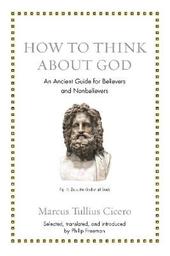
|
How to Think about God: An Ancient Guide for Believers and Nonbelievers
Hardback
Main Details
Description
A vivid and accessible new translation of Cicero's influential writings on the Stoic idea of the divine Most ancient Romans were deeply religious and their world was overflowing with gods - from Jupiter, Minerva, and Mars to countless local divinities, household gods, and ancestral spirits. One of the most influential Roman perspectives on religion came from a nonreligious belief system that is finding new adherents even today: Stoicism. How did the Stoics think about religion? In How to Think about God, Philip Freeman presents vivid new translations of Cicero's On the Nature of the Gods and The Dream of Scipio. In these brief works, Cicero offers a Stoic view of belief, divinity, and human immortality, giving eloquent expression to the religious ideas of one of the most popular schools of Roman and Greek philosophy. On the Nature of the Gods and The Dream of Scipio are Cicero's best-known and most important writings on religion, and they have profoundly shaped Christian and non-Christian thought for more than two thousand years, influencing such luminaries as Augustine, Thomas Aquinas, Dante, and Thomas Jefferson. These works reveal many of the religious aspects of Stoicism, including an understanding of the universe as a materialistic yet continuous and living whole in which both the gods and a supreme God are essential elements. Featuring an introduction, suggestions for further reading, and the original Latin on facing pages, How to Think about God is a compelling guide to the Stoic view of the divine. 'A good summary of the religious thoughts of the Stoics...Philip Freeman's introduction and translation are models of their kind.' - Harry Mount, Catholic Herald
Author Biography
Philip Freeman is the author of more than twenty books on the ancient world, including the Cicero translations How to Be a Friend, How to Grow Old, and How to Run a Country (all Princeton). He holds the Fletcher Jones Chair as a Professor of Humanities at Pepperdine University and lives in Malibu, California.
Reviews"The translation is worthy of praise. It is smooth and colloquial, allowing easy access to rather difficult and technical Latin texts. . . . [Freeman's] approach breathes new life into two Latin texts that deserve more readers."---Ailsa Hunt, Classical Review "A good summary of the religious thoughts of the Stoics. . . . Philip Freeman's introduction and translation are models of their kind."---Harry Mount, Catholic Herald "This small volume by Philip Freeman is an accomplishment and welcomed publication."---Nelu Zugravu, Classica et Christiana
|